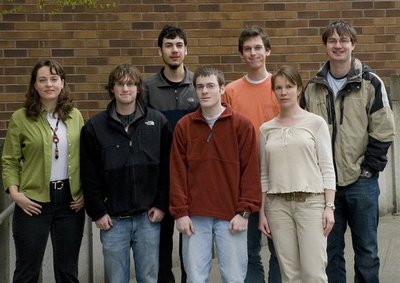April 9, 2009
UW lands impressive finish in Putnam mathematics competition
A combination of raw talent and skilled coaching has landed UW mathematics undergraduates an unprecedented finish in the 2008 Putnam competition, whose results were recently announced.
William Johnson, a sophomore in the Department of Computer Science & Engineering who grew up in Kenmore, placed sixth among about 3,700 competitors. Johnson had the highest score for a student at a public institution.
Two other UW students finished in the top 500 published scores. They are Nate Bottman, a senior in mathematics and Russian languages, and Keyun Tong, a freshman.
Each institution also selects three students to compete as a team and the Putnam publishes rankings individually and by school. The UW team, comprising Johnson, Bottman and Igor Tolkov, a sophomore in mathematics, placed 15th among 405 schools that competed in 2008.
The William Lowell Putnam Mathematical Competition is put on each year by the Mathematical Association of America. The competition began in 1938, and is open to first-time undergraduate students in the United States and Canada. The six-hour test is administered at each school on the first Saturday in December. Students have three hours to complete the first six problems, then break for lunch, then have another three hours to tackle the second problem set.
In a typical year more than half of the roughly 4,000 keen math students who take the competition earn a grand total of zero points. So scoring a few points, as all eight competitors from the UW did this year, is an accomplishment.
Johnson’s sixth-place finish is even more impressive because two more points added to his 99-point score would place him among the top five, who are all named Putnam fellows. The association does not rank the winners or publish who among the five got the highest score. And being named a Putnam fellow is, in mathematics circles, a big deal.
“[If you look at the list or winners] many of the stars of American mathematics are on that list,” said Selim Tuncel, chair of the Department of Mathematics. “If you go back to the 1930s and look at the names [of the Putnam fellows] as you go through the years you recognize them as superstars who then became very famous mathematicians.” Past winners include Nobel prize-winners Richard Feynman and Kenneth Wilson, and John Milnor, David Mumford and Daniel Quillen, all of whom are Fields Medalists, an international honor for young mathematicians.
Much of the credit for this year’s performance, Tuncel says, goes to coach Ioana Dumitriu, an assistant professor in the Department of Mathematics. In 1996, while a student at New York University, Dumitriu was the first woman to be named a Putnam fellow. She is pictured on the Mathematical Association of America’s “Women of Mathematics” poster, now proudly displayed outside the UW departmental office.
When Dumitriu arrived at the UW in 2006, she began informal coaching once a week during the fall quarter. This year she offered a course, The Art of Problem Solving, which doubled as preparation for the competition. Most winning schools, she said, offer such a class.
Dumitriu co-taught the course with UW assistant professor of mathematics Julia Pevtsova. The Russian native didn’t compete in the Putnam, but was a silver medalist in the International Mathematics Olympiad.
“We knew we had the talent,” said Tuncel. But the schools that place well every year — Harvard, Princeton, MIT — have traditionally claimed most of the top spots. “Until we had Julia and Ioana, who knew what this competition was about and how to train for it, we were not even on the map.”
Four brave students registered in the class, and another four audited. (Johnson could not officially register, despite doing all the homework, because he was already taking the maximum number of allowed credits.)
The curriculum covered algebra, geometry, probability, calculus, combinatorics and number theory. One mathematics student said in his evaluation that the breadth of material covered in this class was greater than in all his other courses put together.
“What we tried to do was expose them to the types of problems they would encounter in the competition, and teach approaches and mathematical tricks,” Dumitriu said. She and Pevtsova also taught students to present their solutions, which is required to get full points.
Dumitriu also offered advice based on her own experience taking the Putnam. Some of it may sound familiar to competitors of all types. Sleep well the night before. Pace yourself. And if you feel yourself getting anxious, do a breathing exercise to calm down.
The coaches are not taking credit for Johnson’s performance, which they say is highly unusual. But they are reassured by the fact that all the UW students they worked with got some problems on the contest. “That really made me feel we had achieved something,” Dumitriu said.
Now Dumitriu and Pevtsova are in recruiting mode. They say they’re convinced that more talented students are out there at the UW.
“If you’re good at football, you know where to go. But with mathematics, you might not know how to find us,” Pevtsova said. “We’d like to establish a [Putnam] tradition at the UW.”
Having a larger group creates a bigger community to practice and discuss problems. They would especially like to recruit women. But they say the group is open to students of any major who enjoy mathematics and like to think creatively.
Any undergraduates interested in training for the Putnam next fall should contact Dumitriu or Pevtsova at dumitriu@math.washingon.edu or julia@math.washington.edu.

